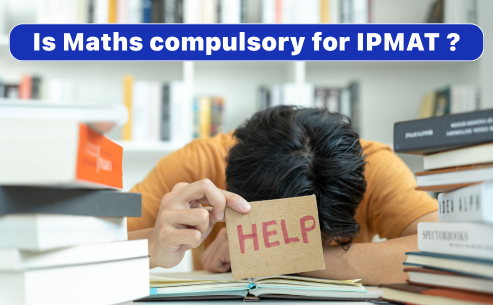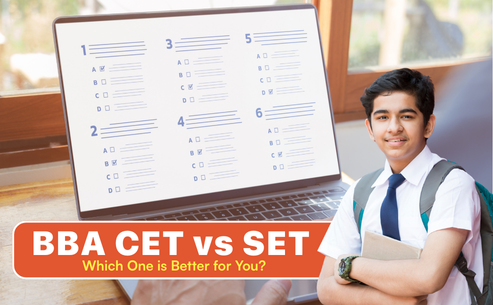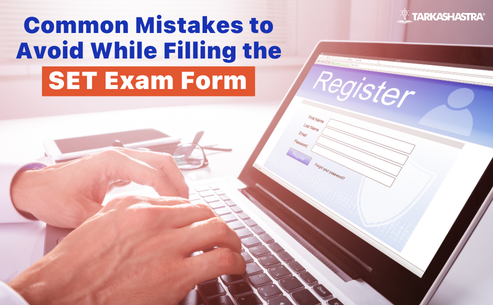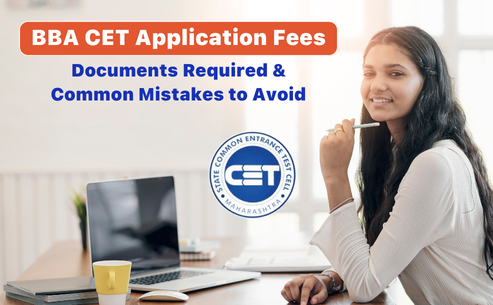It’s one of the most searched questions by Class 11 and 12 students planning a career in management through IIMs. And understandably so. With stream selections, board exam prep, and entrance coaching already on your plate, knowing whether Class 12 Maths is a must for IPMAT can shape your next decisions.
To clarify upfront: You don’t need to have studied Maths in Class 12 to apply for IPMAT. However, mathematical aptitude is still a crucial part of the entrance exam itself
While you don’t need to have Maths in your academic curriculum, the IPMAT entrance test—especially for IIM Indore and IIM Rohtak—does test your mathematical aptitude extensively.
In this blog, we’ll answer the key questions many students ask: Can you appear for IPMAT without studying Maths in Classes 11 and 12? Are you eligible? And most importantly—can you successfully crack the Quant section without a strong Maths foundation?
Let’s begin with what the official eligibility criteria say.
IPMAT 2026 Eligibility Criteria: Is Maths Mandatory in Class 12?
Let’s start with the facts—straight from the official eligibility criteria of IIM Indore and IIM Rohtak.
Both IIMs explicitly mention that students from any stream—Science, Commerce, or Arts—are eligible to apply for the IPMAT exam. This means Maths is not a mandatory subject in Class 11 or 12 to fill out the application form.
Therefore, students from Humanities or Commerce streams who did not take Mathematics in Class 11 or 12 are still fully eligible to apply for IPMAT 2026.
Here’s a quick comparison of the eligibility criteria:
Stream-Wise Eligibility for IPMAT 2026
| Institute | Academic Stream Requirement | Is Class 12 Maths Mandatory? |
| IIM Indore | Open to all streams | No |
| IIM Rohtak | Open to all streams | No |
Other Basic Eligibility Requirements (Common to Both)
| Criteria | Requirement (General/EWS/OBC) |
| Class 10 Marks | Minimum 60% (55% for SC/ST/PwD) |
| Class 12 Marks | Minimum 60% (55% for SC/ST/PwD) |
| Year of Passing | X in 2022 or later, XII in 2024 or 2025 |
| Age Limit | Born on or after Aug 1, 2006 (Indore) or below 20 years as on June 30, 2026 (Rohtak) |
| Subject Combinations | No restriction on subjects including Maths |
Bottom Line:
You don’t need to have taken Maths in Class 12 to appear for IPMAT. But the exam will still test your mathematical aptitude—and that’s where most confusion begins.
Let’s now explore what the actual exam demands in terms of Maths knowledge.
But… Is Maths Required to Crack IPMAT 2026?
While Maths isn’t a mandatory subject in your Class 11–12 academics, it is very much required to crack the IPMAT exam itself.
Both IIM Indore and IIM Rohtak include a whole section dedicated to Quantitative Ability (Maths) in their exam patterns. These sections test your problem-solving speed, accuracy, and understanding of fundamental math concepts.
In fact, for IIM Indore, the Quant section is split into two parts:
- MCQ (Multiple Choice Questions)
- SA (Short Answer)
This means you’re expected to not just recognise the correct option, but actually solve and input the answer accurately—no guesswork here.
What Type of Maths Does IPMAT Test?
- Mostly concepts from Class 9 to Class 12
- Heavy focus on Arithmetic, Algebra, Number Systems, Data Interpretation, and Geometry
- Application-based and logical questions—not just formula plug-ins
Here’s a glimpse of what to expect:
| Exam | Maths Tested Through | Difficulty Level | Evaluation Focus |
| IPMAT Indore | QA (MCQ) + QA (SA) | Moderate–High | Accuracy, logic, conceptual clarity |
| IPMAT Rohtak | QA (MCQ) only | Moderate | Speed, pattern recognition, arithmetic strength |
Key Takeaway:
Even if you didn’t study Maths in 11th-12th, you still need to prepare for it like a core subject to clear the Quant section. It’s not about your board subjects—it’s about your exam readiness.
Maths in IPMAT Syllabus: Indore vs Rohtak
Both IIM Indore and IIM Rohtak test Quantitative Ability (Maths), but they differ in structure, format, and depth. Understanding these differences helps you plan better, especially if you’re from a non-Maths background.
Let’s compare them:
IPMAT Indore – Maths Syllabus Overview
IPMAT Indore includes two Maths sections:
- Quantitative Aptitude (MCQ) – 30 questions
- Quantitative Aptitude (Short Answer) – 15 questions
Key Topics:
- Arithmetic (Percentages, Profit & Loss, Averages, Ratios)
- Algebra (Equations, Identities)
- Number System, Geometry, Mensuration
- Data Interpretation, Coordinate Geometry
- Logarithms, Functions, Inequalities
Unique Feature:
The SA section requires you to type exact numerical answers—no options, no guesses. Precision is crucial.
IPMAT Rohtak – Maths Syllabus Overview
IPMAT Rohtak includes one Maths section:
- Quantitative Ability (MCQ) – 40 questions
Key Topics:
- Arithmetic and Algebra (similar to Indore)
- Geometry, Time-Speed-Distance, Time & Work
- Data Interpretation
- Probability and Permutation & Combination
Unique Feature:
Only MCQs—making it slightly more approachable for non-Maths students with good accuracy and speed.
Comparison Table: IPMAT Indore vs Rohtak – Maths Structure
| Feature | IIM Indore | IIM Rohtak |
| Number of Maths Sections | 2 (MCQ + SA) | 1 (MCQ only) |
| Total Maths Questions | 45 | 40 |
| Format | Mixed (MCQ + Typed Answer) | All MCQs |
| Negative Marking | Only for MCQs (-1) | For all questions (-1) |
| Difficulty Level | Moderate to High | Moderate |
| Best For | Conceptual & accurate students | Speed-focused students |
| Risk-Free Scoring Zone | SA section (no negative marks) | None |
Conclusion:
- IIM Indore tests deeper conceptual understanding and application, especially in the SA section.
- IIM Rohtak favours speed and strategy across standard MCQs.
Can Commerce & Arts Students Crack IPMAT Without Class 12 Maths?
Absolutely—YES!
Even if you haven’t studied Maths in Class 11 or 12, you can still crack IPMAT Indore or Rohtak with the right strategy, discipline, and preparation.
Over the past few years, multiple IPMAT toppers have come from Commerce without Maths or Humanities backgrounds. The key difference? They started early and prepared specifically for the Quant section.
Why It’s Possible:
- IPMAT doesn’t test board-syllabus-level Class 12 Maths (like Integration, Matrices, or Calculus).
- Most of the syllabus is from Class 9–10 and introductory Class 11 topics, especially Arithmetic and Algebra.
- Logical reasoning (Rohtak) and Verbal Ability (both Indore & Rohtak) carry equal or more weightage than Maths.
Realistic Challenges for Non-Maths Students:
| Challenge | Solution |
| Weaker arithmetic and algebra foundation | Start early with NCERTs and basic prep books |
| Fear of Quant and numbers | Break it into topics and master one at a time |
| Slower calculation speed | Practice daily with mental math, speed drills |
| Short Answer (Indore) seems intimidating | Practice accuracy + keyboard typing for numerical answers |
Real Example:
Sayali, a Humanities student from Maharashtra, cracked IPMAT Indore in 2024. She had no Maths in Class 11-12 but prepared intensively for 8 months with mock tests and topic-wise drills. Her strength in Verbal and strong SA scores helped her clear all sectional cutoffs.
Key Strategy for Non-Maths Students:
- Aim to meet and exceed the sectional cutoffs through accurate attempts rather than chasing perfection. Additionally, leverage your strengths—such as Verbal Ability, especially in the Indore exam, where it carries high weightage.
Bottom Line:
Your board stream doesn’t define your IPMAT potential. Your preparation plan does.
How to Prepare for IPMAT Quant Without Class 12 Maths
So, you didn’t take Maths in Class 11 or 12—but want to ace IPMAT? Good news: you still can.
IPMAT Quantitative Aptitude is not about advanced calculus or hardcore engineering math. It’s about clarity in basics, logical thinking, and consistent practice.
Step-by-Step Preparation Plan
1. Start with Class 9–10 NCERT Maths
- Build your foundation in Arithmetic, Algebra, and Number Systems
- Focus on: Percentages, Ratios, Averages, Linear Equations, and Simple Geometry
2. Progress to IPMAT-Level Topics
- Gradually take up topics like:
- Quadratic Equations
- Time-Speed-Distance
- Logarithms & Indices
- Data Interpretation
- Coordinate Geometry
- Use beginner-friendly books like RS Aggarwal or the Pearson Guide to IPMAT
3. Short Answer (SA) Practice for Indore
- Practice typing precise numerical answers
- No options—so accuracy matters more than speed
- Maintain a register of tricky SA-type questions
4. Take Topic-Wise & Sectional Mocks
- Time-bound practice builds stamina
- Analyze accuracy, time taken per question, and weak areas
- Platforms like Tarkashastra’s test series can help simulate the real exam
5. Balance with Verbal and LR (Rohtak)
- Use your strength in English or Logic to compensate for any minor dips in QA
- Savvy test-takers know when to push and when to play safe
Sample Weekly Plan (For Non-Maths Background Students)
| Week | Focus Area | Activities |
| 1–2 | Arithmetic Basics | NCERT + RS Aggarwal: Ratios, Percentages, Averages |
| 3–4 | Algebra + Linear Equations | Learn identities, word problems |
| 5–6 | Geometry + Mensuration | Area, Volume, Angles, Triangles |
| 7–8 | Data Interpretation + Graphs | Pie charts, tables, line graphs |
| 9–12 | Full-length mocks + Revision + SA drills | Practice SA & MCQs + analyze every mock |
Key Tips:
- Learn formulas by understanding, not rote memorisation.
- Use YouTube or coaching videos to break down tough topics visually.
- Don’t skip the QA section out of fear—attempting confidently is better than leaving it blank.
Coaching & Mentorship for Non-Maths Students
If you don’t have a Maths background, you’re not alone—and you certainly don’t have to go it alone either.
Joining the right coaching institute or mentorship platform can be a game-changer for non-Maths students. With proper guidance, structured resources, and regular mock practice, students from Commerce or Humanities streams have consistently cracked IPMAT with impressive scores.
Why Coaching Matters More for Non-Maths Students:
| Challenge Faced | Coaching Support Provided |
| Weak fundamentals | Concept classes from basics – Class 9 & 10 level |
| Lack of practice structure | Topic-wise assignments, mock tests, revision plans |
| Difficulty in solving SA-type questions | Mentor-led problem-solving sessions |
| Low confidence in Maths | Regular feedback and motivation from mentors |
How Tarkashastra Helps Bridge the Gap
At Tarkashastra Academy, we understand that not every IPMAT aspirant comes from a Maths-heavy background. That’s why our approach includes:
- Foundation-to-Advanced Quant classes tailored for non-Maths students
- Short Answer typing drills and explanation-based doubt sessions
- Mentorship by IIM graduates who’ve cracked Quant-heavy exams themselves
- Verbal + LR boosters to balance scores strategically
“When I joined Tarkashastra, I hadn’t studied Maths in Class 12. But the mentors broke every concept down to the basics. I cleared IPMAT Rohtak and got into IIM.”
— Siri Seth, IPMAT 2024 (Humanities Student)
Coaching is Not Just About Content:
- It’s about confidence, consistency, and clarity.
- A good mentor tells you what not to study as much as what to focus on.
- The right batch environment pushes you to compete, attempt, revise, and win.
Bottom line:
Even if Maths was your weak point in school, structured coaching can turn it into a scoring section—with the right mindset and mentorship.
Common Myths About Maths & IPMAT
There’s a lot of confusion around IPMAT and Maths, fuelled mainly by half-truths and assumptions. Let’s bust some of the most common myths that stop students from exploring this golden IIM opportunity.
Myth 1: “You must have Maths in Class 12 to be eligible for IPMAT.”
Truth:
You don’t need Maths as a subject in Class 12. Both IIM Indore and IIM Rohtak allow students from any stream—Science, Commerce, or Arts—to apply.
Myth 2: “Only Science students or JEE aspirants can crack IPMAT.”
Truth:
Many successful candidates are from Commerce without Maths and Humanities backgrounds. What matters is your preparation, not your board subjects.
Myth 3: “IPMAT Rohtak doesn’t have much Maths—only Verbal and LR.”
Truth:
Rohtak has 40 dedicated QA questions—that’s one-third of the exam. Ignoring Maths here will seriously hurt your chances.
Myth 4: “I can ignore the Short Answer section in Indore—it’s optional.”
Truth:
The SA section is compulsory and carries 60 marks. It has no negative marking, making it a huge scoring opportunity, especially for cautious test-takers.
Myth 5: “If I didn’t like Maths in school, I shouldn’t attempt IPMAT.”
Truth:
IPMAT doesn’t test school-style Maths theory. It checks your logical thinking, number sense, and application skills—things you can develop even if you feared Maths earlier.
Summary Table – Myth vs Reality
| Myth | Reality |
| Must have Maths in Class 12 | Not required |
| Only Science students succeed | Commerce/Humanities students also crack it |
| Rohtak has little Maths | 40 QA questions—very significant |
| SA section is optional or avoidable | It’s compulsory and scoring |
| Non-Maths students should avoid IPMAT | With prep, it’s achievable for all backgrounds |
Bottom Line:
Don’t let myths decide your future. Get the facts. Understand the exam. Then build your plan.
Final Verdict: Do You Need Maths for IPMAT 2026?
Let’s settle the debate once and for all.
No, Maths is not compulsory in Class 11 or 12 to be eligible for IPMAT 2026.
Regardless of whether you studied Maths in your senior secondary years, you’re eligible—and capable—of succeeding in IPMAT. However, strong mathematical aptitude remains a critical component of success in the exam.
But here’s the reality check: Yes, you do need Maths aptitude to crack IPMAT.
Quantitative Ability is a core part of the exam, whether it’s the MCQ or Short Answer section in Indore, or the QA section in Rohtak. It’s not about whether you studied Maths formally—it’s about whether you’re willing to prepare now.
The Two Truths Together:
| Question | Answer |
| Is Maths required in the Class 12 curriculum? | No – You are eligible from any stream (Arts/Commerce/Science) |
| Is Maths required to clear the exam? | Yes – Quantitative Aptitude is a major section in both IPMAT exams |
Final Takeaways for Aspirants:
- Don’t drop your IIM dream just because you didn’t take Maths in Class 11–12.
- Start early, focus on building conceptual clarity, and take help where needed.
- Coaching, mock tests, and a smart strategy can bridge the Maths gap for anyone.
- Your stream does not define your success—your preparation does.
Remember:
Ultimately, your background doesn’t limit your potential. What matters is your mindset, your consistency in preparation, and your willingness to begin—regardless of where you stand today.
So, whether you loved Maths or loathed it, you can still crack IPMAT 2026. You just need the right plan, the proper support, and the correct belief.
Conclusion: Tarkashastra is Here to Help You Win—With or Without Maths
At Tarkashastra Academy, we’ve mentored hundreds of IPMAT aspirants—many of whom came from Commerce and Arts backgrounds with zero Maths in Class 12. And guess what? They’ve made it to IIMs.
We don’t just teach formulas—we help you build confidence in Quant, master Short Answer tricks, and balance your Verbal + Logical strengths. With personalized guidance, beginner-friendly explanations, and regular mock drills, we make IPMAT prep accessible—even if you’ve never liked Maths before.
If you’ve got the dream, we’ll show you the strategy. Because at Tarkashastra, your background doesn’t define your potential. Your preparation does.
FAQs – IPMAT and Maths Requirement
1. Is Maths compulsory in Class 11 or 12 to apply for IPMAT?
No, Maths is not a mandatory subject in Class 11 or 12 to apply for IPMAT. Both IIM Indore and IIM Rohtak allow students from any stream—Arts, Commerce, or Science. You are eligible as long as you meet the minimum marks and age criteria.
2. Can Arts students without Maths crack IPMAT?
Yes, Arts students can crack IPMAT with the right preparation strategy. Many successful candidates come from non-Maths backgrounds. Focus on building foundational Maths and maximising your Verbal and Logical Reasoning scores.
3. Does the IPMAT test Class 12 Maths topics like Calculus or Matrices?
No, topics like Calculus, Matrices, or Integrals are not tested. IPMAT mainly focuses on the Class 9 to Class 11 level of Arithmetic, Algebra, Geometry, and Logical application. The exam tests aptitude, not textbook Maths.
4. Which exam is easier for non-Maths students—IPUMAT Indore or Rohtak?
Rohtak is relatively more approachable for non-Maths students as it has only MCQs and no Short Answer section. However, it includes Logical Reasoning and a strict negative marking pattern. Indore, while tougher, offers a risk-free SA section.
5. Is it possible to clear the Quant section without having Maths in Class 12?
Yes, with practice, even non-Maths students can clear the Quant section. The questions are conceptual, and solving past papers, mocks, and learning from mentors makes a big difference. Early preparation is key.
6. What topics should a non-Maths student focus on in Quant?
Start with Arithmetic—Percentages, Ratios, Averages, Profit & Loss. Then cover Algebra, Number Systems, and basic Geometry. Avoid advanced theory and focus on solving using logic and elimination.
7. Are calculators allowed in IPMAT?
No, calculators or electronic devices are not allowed in the IPMAT exam. All calculations must be done manually, so practising mental math and approximation techniques is helpful.
8. Is the Short Answer section in IPMAT Indore compulsory?
Yes, it is a compulsory section and carries 60 marks. It has no negative marking, making it ideal for scoring safely. Skipping it can drastically lower your total score.
9. Does IPMAT Rohtak have a Short Answer section?
No, IPMAT Rohtak only has multiple-choice questions (MCQs). The entire paper is MCQ-based and includes Quant, Verbal, and Logical Reasoning, with -1 for every incorrect answer.
10. How can I build my Math base if I didn’t study it in Class 11–12?
Start with the NCERT Maths books for Class 9 and 10. Use beginner-friendly guides like RS Aggarwal and follow coaching material that explains each topic from scratch. Take it topic by topic.
11. What are the best books for Quant for non-Maths IPMAT aspirants?
Books like RS Aggarwal’s Quantitative Aptitude, Arun Sharma’s CAT Quant Basics, and the Pearson Guide to IPMAT are excellent. These books build concepts with easy-to-understand steps.
12. Can I prepare for IPMAT without coaching?
Yes, but coaching helps streamline your preparation, especially if you come from a non-Maths background. Self-study is possible with discipline, but mentorship provides structure, mocks, and personal guidance.
13. How important is the Verbal section for non-Maths students?
It’s essential, especially in IPMAT Indore, where Verbal has the highest cutoff. A strong Verbal score can compensate for a slightly weaker Quant performance. Prioritize Reading Comprehension and Vocabulary.
14. Are there any toppers from Commerce or Arts streams?
Yes, every year, students from Commerce (without Maths) and Humanities backgrounds make it to IIM Indore and Rohtak. Their success lies in strategic preparation and mastering the basics.
15. How many Maths questions are there in IPMAT Indore and Rohtak?
Indore has 45 Maths questions (30 MCQ + 15 SA), while Rohtak has 40 QA MCQs. That’s nearly one-third of the paper, so Quant can’t be ignored.
16. How much time should I dedicate to Quant as a non-Maths student?
You should start at least 8–10 months in advance and practice QA for 1 to 1.5 hours daily. Consistency is more important than speed in the early stages.
17. Can Logical Reasoning make up for weak Maths in IPMAT Rohtak?
Yes, Logical Reasoning can be a strength for non-Maths students in Rohtak. With strong LR and Verbal scores, you can afford to aim for just the cutoff in Quant.
18. Is IPMAT Rohtak less risky for non-Maths students?
It depends. While Rohtak doesn’t have the SA section, it does penalise wrong answers in every section. Indore has a safer SA section but more challenging questions. Choose based on your strengths.
19. Will I be at a disadvantage compared to Science students?
Not necessarily. IPMAT rewards thoughtful preparation, not just background. Many Science students also struggle in Verbal or SA sections. Play to your strengths and focus on consistent progress.
20. Should I attempt both Indore and Rohtak if I’m from a non-Maths stream?
Yes. Applying to both increases your chances. You can tailor your prep to Indore’s SA section and Rohtak’s Logical Reasoning. Both require basic Maths aptitude, which is manageable with effort.
21. Is there any weightage for having studied Maths in Class 12 during selection?
No, there is no such weightage. Selection is based on IPMAT score, personal interview performance, and academic consistency, regardless of subject stream.
22. How can I improve my speed in Maths if I’m from a non-Maths stream?
Practice mental calculation tricks, approximation methods, and use timers during mocks. Learning shortcuts for percentages, ratios, and simplifications will boost your attempt rate.
23. Does the IPMAT interview panel ask about your Maths background?
Not directly. They may ask general academic and logical questions, but won’t penalise you for not having Maths in Class 12. Be confident and honest during interviews.
24. What’s a realistic Quant score a non-Maths student can target?
Aim to clear the sectional cutoff—usually 40–50% of the total Quant score. Combine this with strong Verbal and LR scores for a competitive composite score.
25. Final verdict: Can I crack IPMAT without studying Maths in school?
Yes, 100%. You need to prepare smartly, stay consistent, and focus on foundational problem-solving. With the proper guidance, non-Maths students can and do crack IPMAT every year.







